Mises, Ludwig von. Human Action: A Treatise on Economics
Подождите немного. Документ загружается.

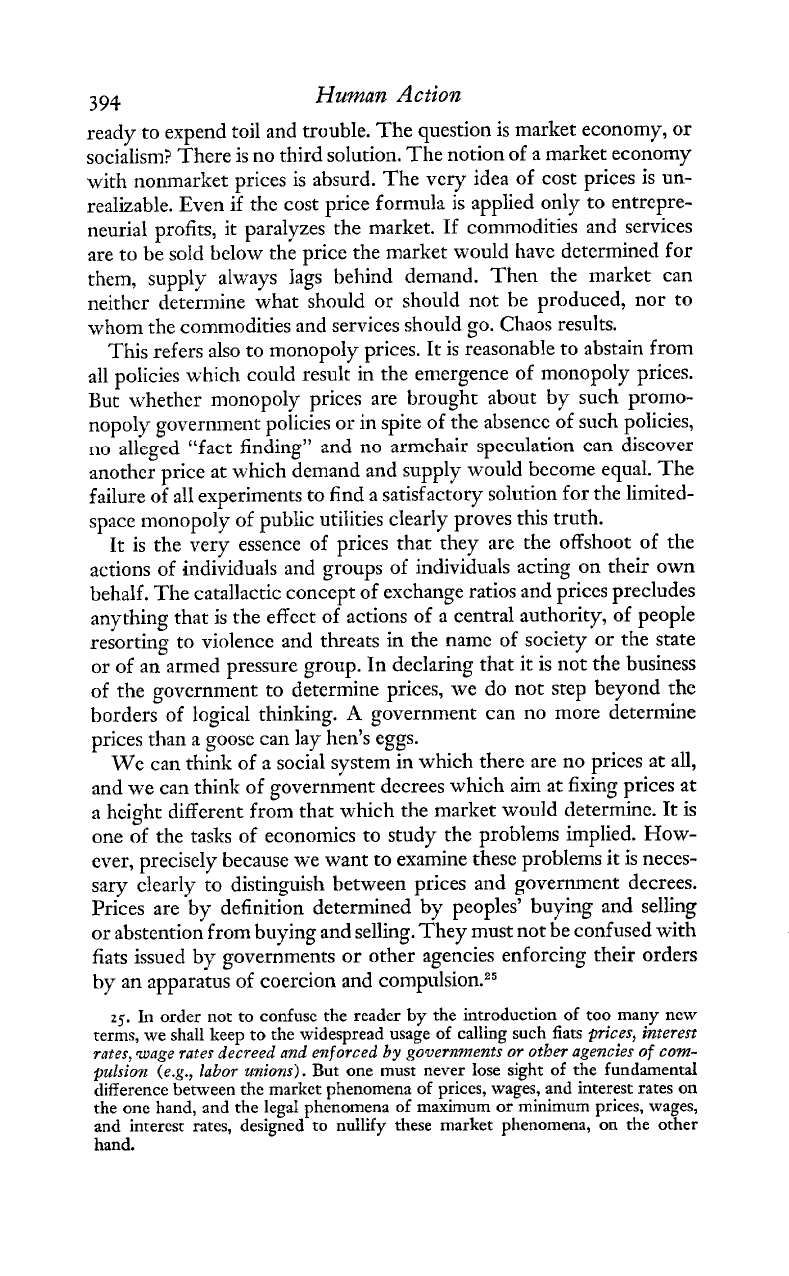
3
94
Human
Action
ready to expend toil and trouble. The question is market economy, or
socialism? Thcre is no third solution. The notion of a market economy
with nonmarket prices is absurd. The vcry idea of cost prices is un-
realizable. Even if the cost price formula is applied only to entrepre-
neurial profits, it paralyzes the market. If commodities and services
are to be sold below the price the market would have dctcrmined for
them, supply always Jags behind demand. Then the market can
neither determine w-hat should or should not be produced, nor to
whom the commodities and services should go. Chaos results.
This refers also to monopoly prices. It is reasonable to abstain from
all policies which could result in the emergence of monopoly prices.
But whether monopoly prices are brought about by such promo-
nopoly government policies or in spite of the absence of such policies,
no allkged "fact finding" and no armchair speculation can discover
another price at which demand and supply would become equal. The
failure of a11 experiments to find a satisfactory solution for the limited-
space monopoly of public utilities clearly proves this truth.
It is the very essence of prices that they are the offshoot of the
actions of individuals and groups of individuals acting on their own
behalf. The catallactic concept of exchange ratios and prices precludes
anything that is the effect
of
actions of a central authority, of people
resorting to violence and threats in the name of society or the state
or of an armed pressure group. In declaring that it is not the business
of the government to determine prices, we do not step beyond the
borders of logical thinking.
A
government can no more determine
prices than a goose can lay hen's eggs.
We can think of a social system in which there are no prices at all,
and we can think of government decrees which
aim
at fixing prices at
a height different from that w-hich the market would determine.
It
is
one of the tasks of economics to study the problems implied. How-
ever, precisely because we want to examine these problems it is neces-
sary clearly to distinguish between prices and government decrees.
Prices are by definition determined-by peoples' buying and selling
or abstention from buying and selling. They must not be confused with
fiats issued by governments or other agencies enforcing their orders
by an apparatus of coercion and compulsi~n.~~
25.
In order not to confuse the reader by the introduction of too many new
terms, we shall keep to the widespread usage of calling such fiats
prices, interest
rates,
wage
sates decreed and enforced
by
governments or
other
agencies of com-
pulsion
(eg., labor unions).
But one must never lose sight of the fundamental
difference between the market phenomena of prices, wages, and interest rates on
the one hand, and the legal phenomena of maximum or minimum prices, wages,
and interest rates, designed to nullify these market phenomena, on the other
hand.
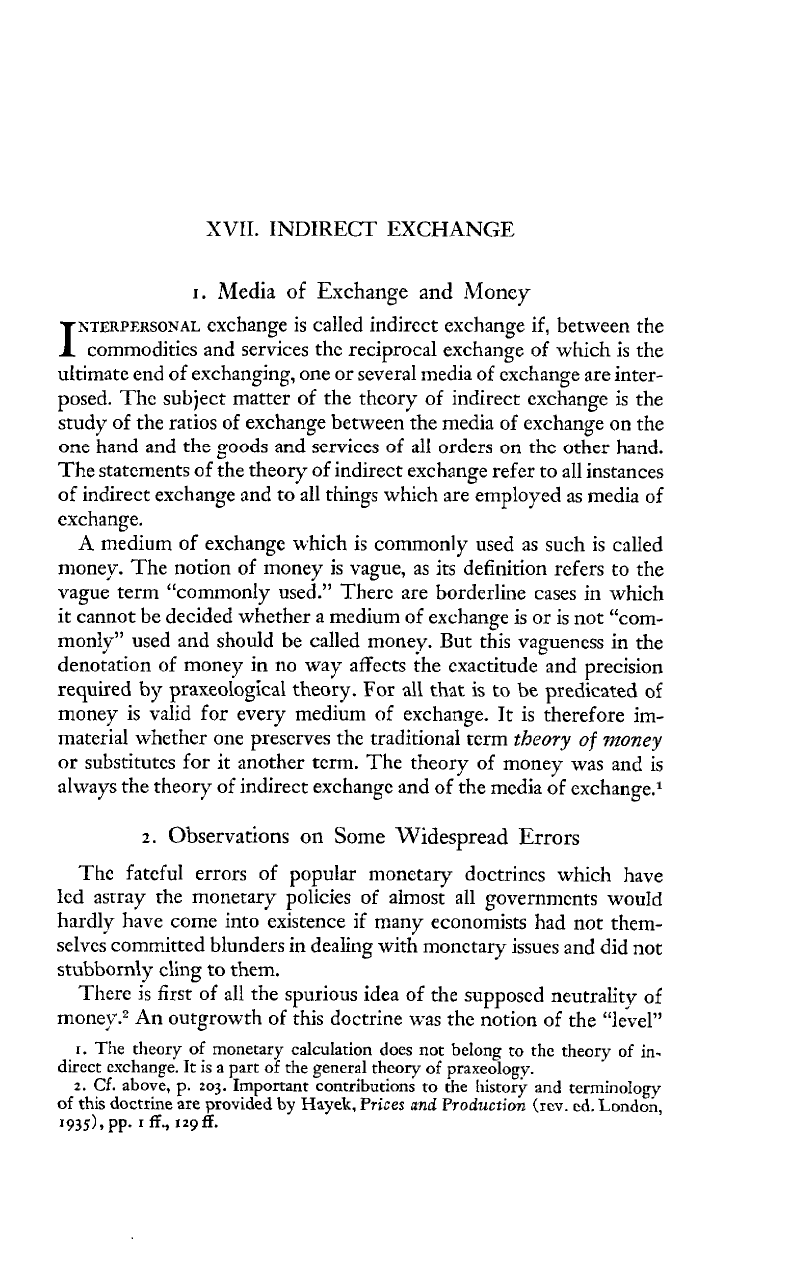
XVII.
INDIRECT
EXCHANGE
I.
Media of Exchange and Money
I
STERPEKSONAL
cxchange is called indircct exchange if, between the
commodities
and services thc reciprocal exchange of which is the
ultimate end of exchanging, one or several media of exchange are inter-
posed. Thc subject matter of the theory of indirect cxchange is the
study of the ratios of exchange between the media of exchange on the
one hand and the goods and services of all orders on thc other hand.
The statements of the theory of indirect exchange refer to all instances
of indirect exchange and to all things which are employed as media of
cxchange.
A
medium of exchange which is commonly used as such is called
money. The notion of money is vague, as its definition refers to the
vague term "commonly used." Therc are borderline cases
in
which
it cannot be decided whether a medium of exchange is or is not "com-
monly-" used and should be called money. But this vaguencss in the
denotation of money in no way affects the cxactitude and precision
required
by
praxeological theory.
For
all
that
is
to
be
predicated
of
money is valid for every medium of exchange. It is therefore im-
material whether one prescrves the traditional tcrm
theory
of
money
or substitutes for it another tcrm. The theory of money was and is
always the theory of indirect exchangc and of the media of cxchange.1
2.
Observations on Some Widespread Errors
Thc fateful errors of popular monetary doctrincs which have
Icd astray the monetary policies of almost all
governments
would
hardly have come into existence if many economists had not them-
selves committed blunders in dealing with monctary issues and did not
stubbornly cling to them.
Thcrc
is
first of
all
the spurious idea of the supposed neutrality of
money.2
An
outgrowth of this doctrine was the notion of the "level"
r.
The theory of monetary calculation does not belong to the theory
of
in.
direct exchange. It
is
a part of the general theory of praxeology.
2.
Cf.
above,
p.
203. Important contributions to the history and termindop
of this doctrine are provided
by
Hayek,
Prices
md
Production
(rev.
ed. London,
19351,
pp.
1
ff,
129
ff.
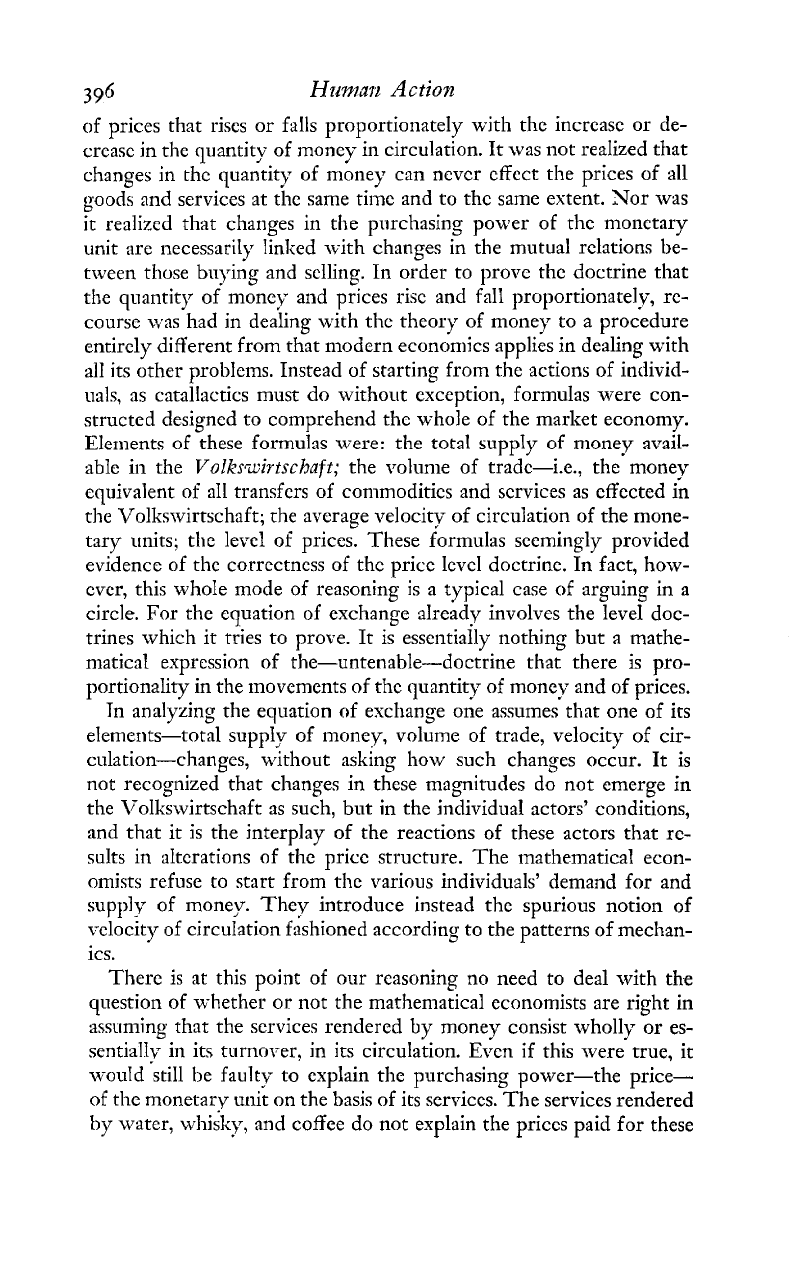
396
Human
Action
of prices that rises or falls proportionately with the increase or cie-
crcasc in the quantity of money in circulation. It was not realized that
changes in thc quantity of money can ncvcr effect the prices of all
goods and services at the same time and to thc same extent. Nor was
it
realized that changes in the purchasing power of the monetary
unit are necessaril~ linked with changes in the mutual rclations be-
tween tllose buying and sclling. In order to provc the doctrine that
the quantity of moncy and prices risc and fall proportionately, rc-
course was had in dealing with thc theory of money to a procedure
entirely different from that modern economics applies in dealing with
all its other
problems.
Instead of starting from the actions of individ-
uals, as catallactics must do without exception, formulas w-ere con-
structed designed to comprehend thc whole of the market economy.
Elements of these formulas were: the total supply of money
avail-
able in the
Volkswirtschaft;
the volume of tradc-i.e., the money
equivalent
of all transfers of conimoditics and scrvices as effected in
the Volkswirtschaft; the average velocity of circulation of the mone-
tary units: the level of prices. These formulas scemingly provided
evidence of the correctness of thc pricc lcvcl doctrine. In fact, how-
ever,
this whoIe mode of reasoning is a typical case
of
arguing in a
circle. For the equation of exchange already involves the level doc-
trines which it tries to prove. It is essentiaily nothing but a rnathe-
matical expression of the-untenable-doctrine that there is pro-
portionality in the Inovcments
of
thc quantity of money and of prices.
Tn analyzing the equation of exchange one assumes that one of its
elements-total supply of money, volume of trade, velocity of cir-
culation-changcs, without asking how such changes ocdur. It is
not recognized that changes in these magnitudes do not emerge in
the Volkswirtschaft as such, but in the individual actors' conditions,
and that it is the interplay
of
the reactions of these actors that rc-
sults in
alterations
of the pricc structure. The mathematical econ-
omists refuse to start from the various individuals' demand for and
supplv of money. They introduce instead thc spurious notion of
velocity of circulation fashioned according to the patterns of mechan-
ics.
There is at this point of our reasoning no need to deal with the
question of whether or not the mathematical economists are right in
assuming that the services rendered by money consist wholl\; or es-
sentially in its turnover. in its circulation.
E&
if this were true, it
w-ouId still be faulty to explain the purchasing power-the price-
of the monetary unit on the basis of its services. The services rendered
by water, whi&, and coffee do not explain the prices paid for these
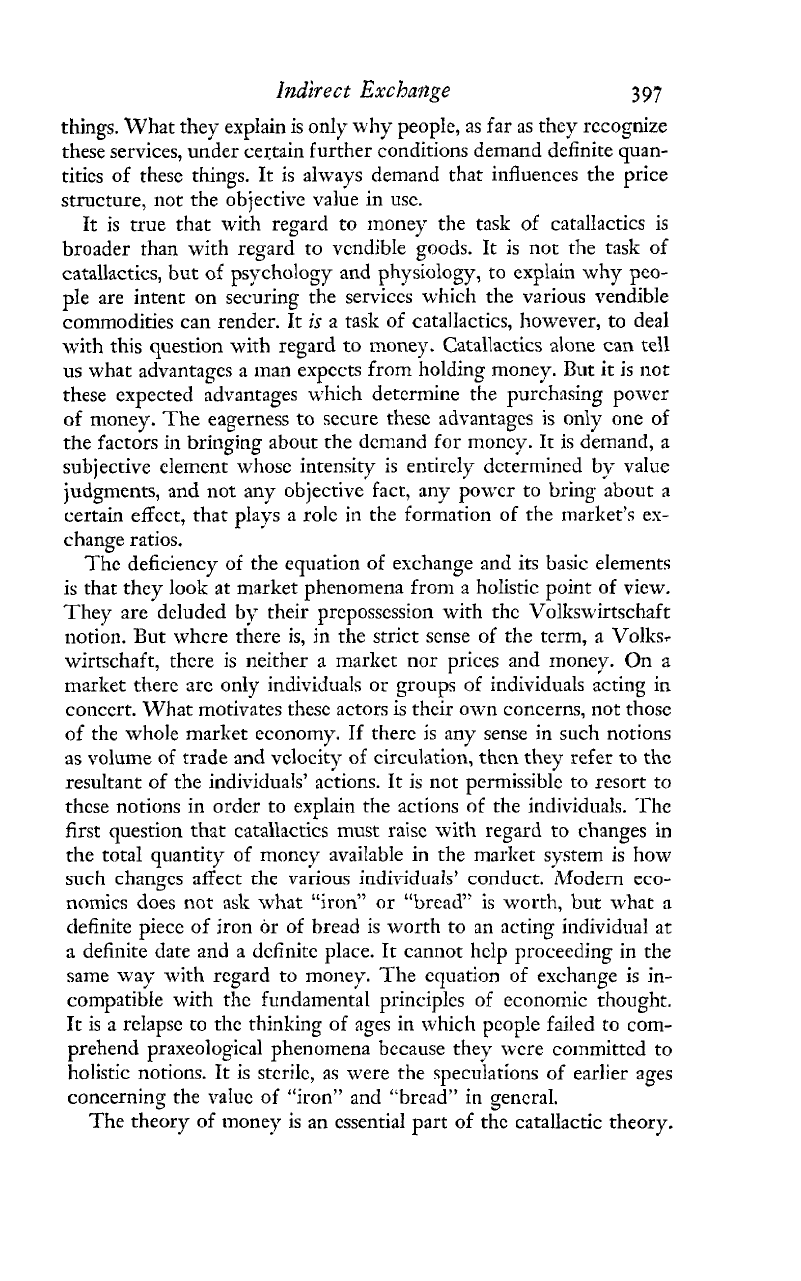
Indirect
Exchange
3
97
things. What they explain is only why people, as far as they recognize
these services, under certain further conditions demand definite quan-
tities of these things. It is always demand that influences the price
structure, not the objective value in use.
It is true that with regard to money the task of catallactics is
broader than with regard to vendible goods. It is not the task of
catallactics, but
of
psychology and physiology, to explain why peo-
ple are intent on securing the services which the various vendible
commodities can render.
Tt
is
a task of catallactics, however, to deal
with this question with regard to money. Catallactics alone can
tel
us what advantages a man expects from holding money. But it is not
these expected advantages which determine the purchasing power
of
money.
The
eagerness to secure these advantages is only one of
the factors in bringing about the demand for rnoncy. It is demand,
a
subjective element whose intensity is entirely dcterrnined by value
judgments, and not any objective fact, any powcr to bring about
a
certain effect, that plays a role in the formation of the market's ex-
change ratios.
The deficiency of the equation of exchange and its basic elements
is that they look at market phenomena from
a
holistic point of view.
They are deluded by their prepossession with the Volkswirtschaft
notion. But whcre tlkre is, in the strict sense of the term,
a
Volksr
wirtschaft, there is neither
a
market nor prices and money. On a
market there are only individuals or groups of individuals acting in
concert. What motivates these actors is their own concerns, not those
of the whole market economy. If there is any sense in such notions
as volume of trade and velocity of circulation, then they refer
to
the
resultant of the individuals' actions. It is not permissible to resort to
these notions in order to explain the actions of the individuals.
'lh
first question that catallactics must raise with regard to changes
in
the total quantity of money available in the market system is how
such
changcs affect the vahous individuals' conduct. -~odern eco-
nomics does not
ask
what
"iron"
or "bread" is worth, but what a
definite piece of iron or of bread is worth to an acting individual at
a
definite date and a definite place. It cannot help proceeding in the
same way with regard to money. The equation of exchange is in-
compatible with the fundamental principles of economic thought.
It is a relapse to the thinking of ages in which people failed to com-
prehend praxeological phenomena because they were committed to
holistic notions. It is stcrilc, as were the specularions of earlier ages
concerning the vaIuc of "iron" and "bread" in general.
The theory
of
money is an essential part of the catallactic theory.

398
Human
Action
It must be dealt with in the same manner which is applied to all other
cataIIactic problems.
3.
Demand
for h4oney
and
Supply
of Money
In the marketability of the various commodities and scrvices there
prcvail considerable differences. There are goods for which it is not
difficult to find applicants ready to disburse the highest recompense
which, under the given state of affairs, can possibly be obtained,
or
a recompense only slightly smaller. There are other goods for which
it is very hard to find
a
customer quickly, even if the vendor is ready
to be content with a compensation much smaller than hc could reap
if he could find another aspirant whose demand is more intense. It
is these differences in the marketability of the various commodities
and scrvices which created indirect exchange.
A
man who at the
instant cannot acquire what he wants to get for the conduct of his
own household or business, or who does not yet know what kind of
goods he will need in the uncertain future, comes nearer to his ulti-
mate goal if he exchanges a less markctable good he wants to trade
against a more marlwable one. It may also happen that the physical
properties of the merchandise he wants to give away (as, for instance,
its perishability or the costs incurred by its storage or similar circum-
stances) impel him not to wait longer. Sometimes he may be prompted
to hurry in giving away the good concerned because he is afraid of
a deterioration of its market value. In all such cases he improves his
own situation in acquiring a more marketable good, even
if
this good
is not suitable to satisfy directly any of his own needs.
A
medium of exchange is a good which people acquire neither for
their own consumption nor for employment in their own production
activities, but with the intention of exchanging it at a later date
against those goods which they want to use either for consumption
or for production.
Money is a medium of exchange. It is the most marketable good
which people acquire because they want to offer it in later acts of
interpersonal exchange. Money is the thing which serves as the gen-
erally accepted and commonly used medium of exchange. This is
its only function. All the other functions which people ascribe to
money are merely particular aspects of its primary and sole function,
that of a medium of e~change.~
Media of exchange are economic goods. They are scarce; there is
3.
Cf.
Mises,
The
Theory
of
Money and Credit,
trans,
by
H.
E.
Batson (Lon-
don
and
New
York,
1934),
pp.
34-37.
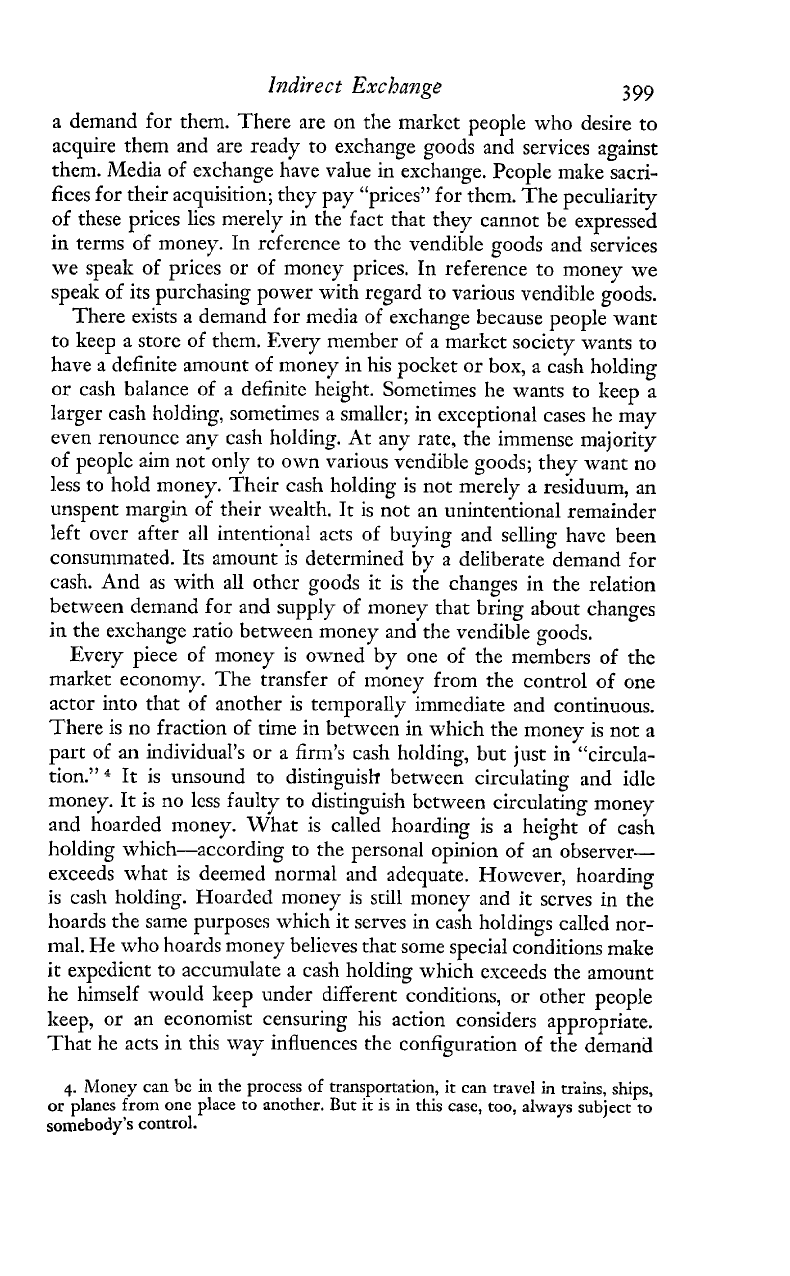
Indirect
Exchange
3
99
a
demand for them. There are on the rnarkct people who desire to
acquire them and are ready to exchange goods and services against
them. Media of exchange have value in exchange. People make sacri-
fices for their acquisition; they pay "prices" for them. The peculiarity
of these prices lies merely in the fact that they cannot be expressed
in terms of money. In reference to thc vendible goods and services
we speak of prices or of money prices. In reference to money we
speak of its purchasing power with regard to various vendible goods.
There exists a demand for media of exchange because people want
to keep a store of them. Every member of a rnarkct society wants to
have a definite amount of money in his pocket or box, a cash holding
or cash balance of a definite height. Sometimes he wants to keep a
larger cash holding, sometimes a smaller; in exceptional cases he may
even renouncc any cash holding. At any rate, the immense majority
of peoplc aim not only to own various vendible goods; they want no
less to hold money. Their cash holding is not merely a residuum, an
unspent margin of their wealth. It is not an unintentional remainder
left over after all intentiqnal acts of buying and selling havc been
consummated. Its amount is determined
by
a deliberate demand for
cash. And as with all othcr goods it is the changes in the relation
between demand for and supply of money that bring about changes
in the exchange ratio between money and the vendible goods.
Every piece of money is owned by one of the members of the
market economy. The transfer of money from the control of one
actor into that of another
is
temporally immediate and continuous.
There is no fraction of time in between in which the money is not a
pare of an individual's or a firm's cash holding, but just in "circula-
tion." It is unsound to distinguish between circulating and idle
money. It is no lcss faulty to distinguish bctween circulating money
and hoarded money. What is called hoarding is a height of cash
holding which-according to the personal opinion of an observer-
exceeds what is deemed normal and adequate. However, hoarding
is cash holding. Hoarded money is sciil money and it serves in the
hoards the same purposes which it serves in cash holdings caIled nor-
mal. He who hoards money believes that some special conditions make
it expedicnt to accumulate
a
cash holding which exceeds the amount
he himself would keep under different conditions, or other people
keep, or an economist censuring his action considers appropriate.
That he acts in this way influences the configuration of the demand
4.
Money can be
in
the process of transportation, it can travel in trains, ships,
or planes from one place to another. But it
is
in this case, too, always subject
to
control.
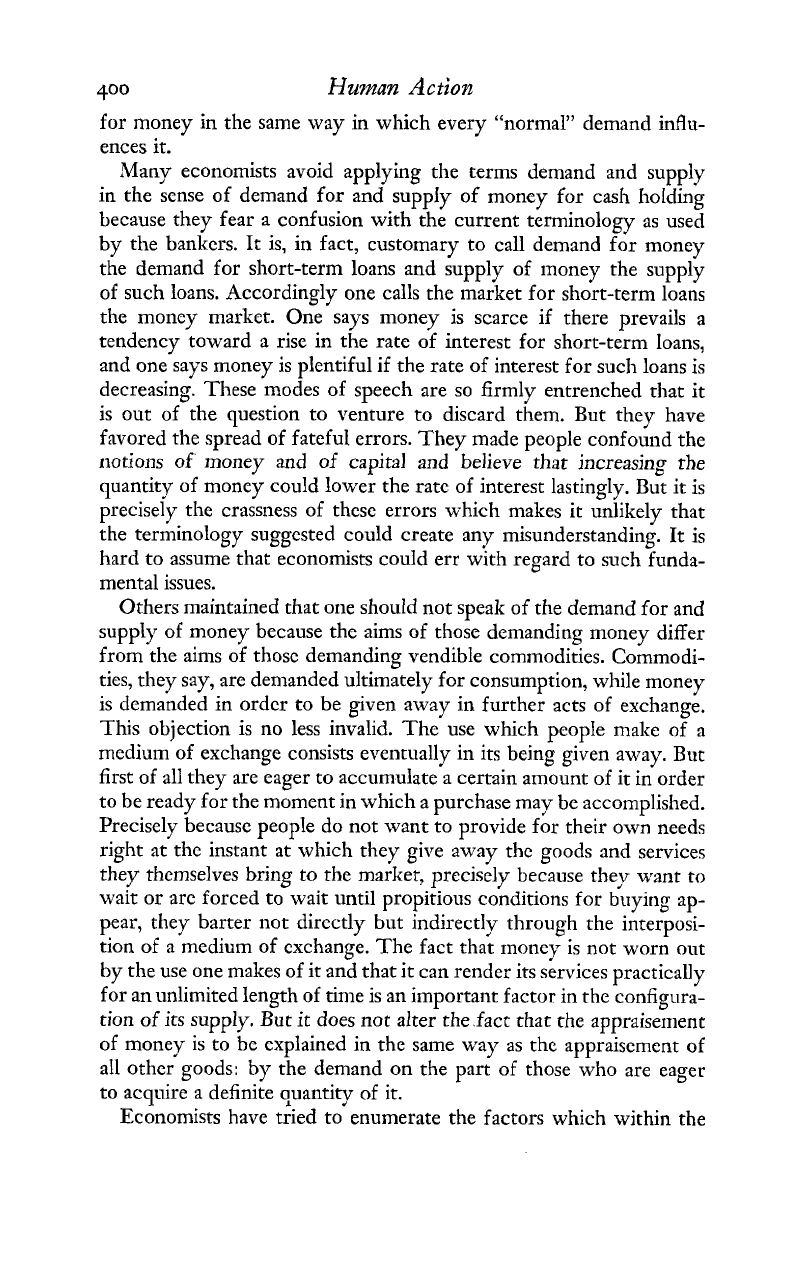
400
Human
Action
for money in the same way in which every "normal" demand influ-
ences it.
Many economists avoid applying the terms demand and supply
in the sense of demand for and supply of money for cash hoIding
because they fear a confusion with the current terminology as used
by the bankers. It is, in fact, customary to call demand for money
the demand for short-term loans and supply of money the supply
of such loans. Accordingly one calls the market for short-term loans
the moncy market. One says money is scarce if there prevails a
tendency toward a rise in the rate of interest for short-term loans,
and one says money is plentiful if the rate of interest for such loans is
decreasing. These modes of speech are so firmly entrenched that it
is out of the question to venture to discard them. But they have
favored the spread of fateful errors. They made people confound the
notions of money and of capital and believe that increasing the
quantity of money could lower the rate of interest lastingly. But it is
preciseiy the crassness of thcsc errors which makes it unlikely that
the terminology suggested could create any misunderstanding. It is
hard to assume that economists could err with regard to such funda-
mental issues.
Ofhers maintained that one should not speak of the demand for and
supply of money because the aims of those demanding money differ
from the aims of those demanding vendible commodities. Commodi-
ties, they say, are demanded ultimately for consumption, while money
is demanded in ordcr to be given away in further acts of exchange.
This objection is no less invalid. The use which pcopIe make of a
medium of exchange consists eventually in its being given away. But
first of all they are eager to accumulate a certain amount of it in order
to be ready for the moment in which a purchase may be accomplished.
Precisely because people do not want to provide for their own needs
right at thc instant at which they give away the goods and services
they themselves bring
to
the market, precisely because they want to
wait or are forced to wait until propitious conditions for buying ap-
pear, they barter not directly but indirectly through the interposi-
tion of a medium of cxchange. The fact that money is not worn out
by the use one makes of it and that it can render its services practically
for an unlimited length of time is an important factor in the configura-
tion of its supply. But it does not alter the fact that the appraisement
of money is to he explained in the same way as the appraisement of
a1 other goods: by the demand on the part of those who are eager
to acquire a definite quantity of
it.
Economists have tried to enumerate the factors which within the
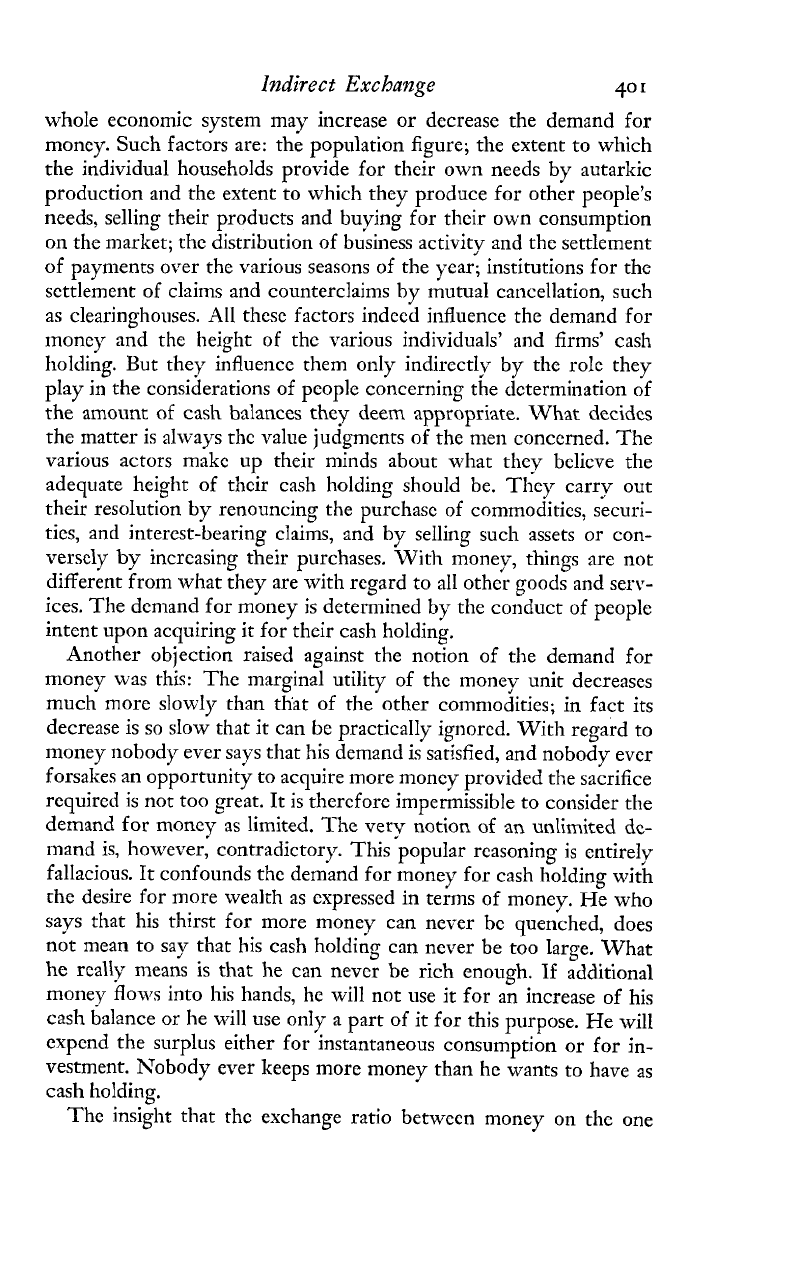
Indirect Exchange
401
whole economic system may ilcrease or decrease the demand for
money. Such factors are: the population figure; the extent to which
the individual households provide for their own needs by autarkic
production and the extent to which they produce for other people's
needs, selling their products and buying for thcir own consumption
on the market; thc distribution of business activity and the settlement
of payments over the various seasons of the year; institutions for the
settlement of claims and counterclaims by mutual cancellation, such
as clearinghouses. All these factors indeed influence the demand for
money and the height of the various individuals' and firms' cash
holding. But they influence them only indirectly by the role they
play in the considerations of people concerning the determination of
the amount of cash balances they deem appropriate. What decides
thc matter is always the value judgments of the nien concerned. The
various actors make up their minds about what they believe the
adequate height of thcir cash holding should be. They carry out
their resolution by renouncing the purchase of commodities, securi-
ties, and interest-bearing claims, and by selling such assets or con-
versely by increasing their purchases. With money, things are not
different from what they are with regard to all other goods and serv-
ices. The demand for money is determined by the conduct of people
intent upon acquiring
it
for their cash holdink.
Another objection raised against the notion of the demand for
money was this: The marginal utility of the money unit decreases
much more slowly than that of the other commodities; in fact its
decrease is so slow that it can be practically ignored. With regard to
money nobody ever says that his demand is satisfied, and nobody ever
forsakes an opportunity to acquire more money provided the sacrifice
required is not too great. It is therefore impermissible to consider the
demand for money as limited.
The
very
notion
of
an unlimited de-
mand is, however, contradictory. This popular reasoning is cntirely
fallacious. It confounds the demand for money for cash holding with
.,
the desire for more wealth as expressed in terms of money. He who
says that his thirst for more money can never be quenched, does
not mean to say that his cash holding can never be too large. What
he
really means is that he can never be rich enough. If additional
money flou7s into his hands, he will not use it for an increase of his
cash balance or he will use only a part of it for this purpose. He will
expend the surplus either for instantaneous consumption or for in-
vestment. Nobody ever keeps more money than hc wants to have as
cash holding.
Thc insight that the exchange ratio between money on the one
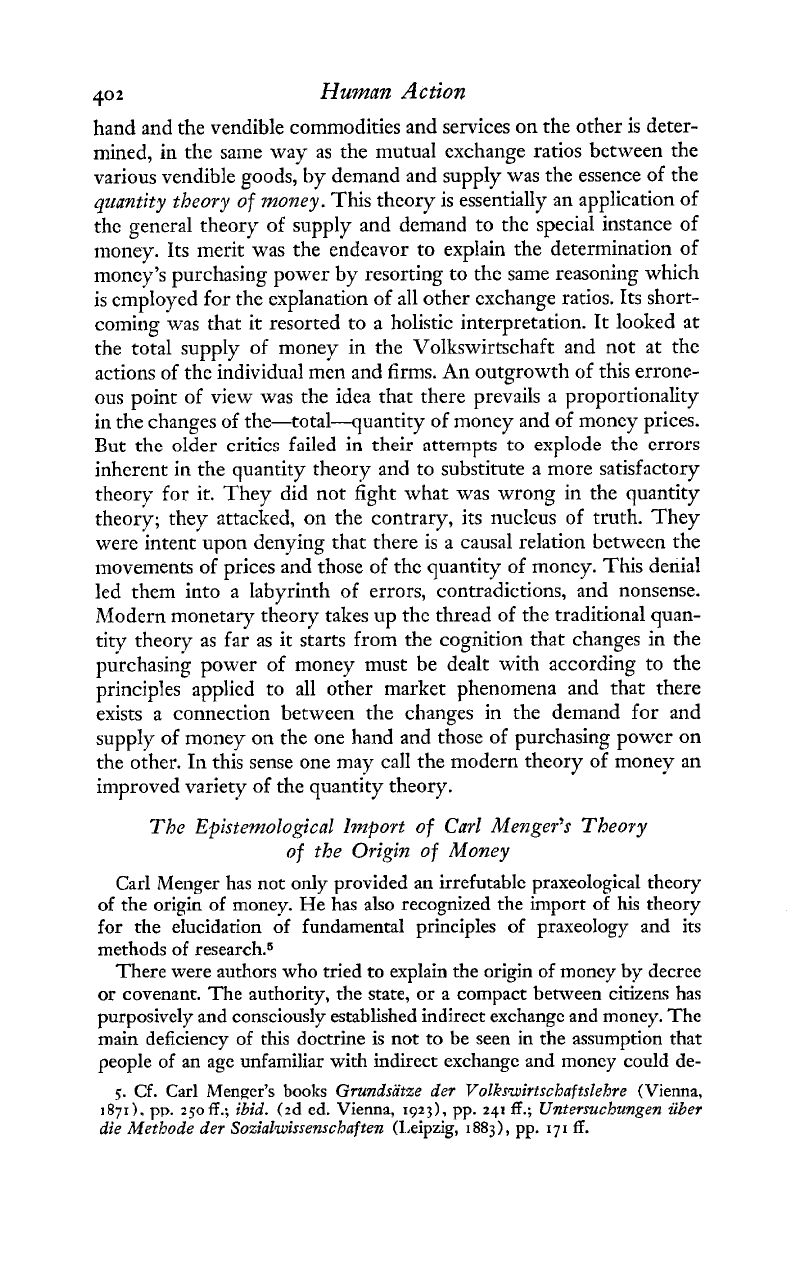
402
Human
Action
hand and the vendible commodities and services on the other is deter-
mined, in the same way as the mutual cxchange ratios between the
various vendible goods, by demand and supply was the essence of the
quantity theory of money.
This thcory is essentially an application of
the general theory of supply and demand to the special instance of
money. Its merit was the endcavor to explain the determination of
money's purchasing power by resorting to the same reasoning which
is cmployed for the explanation of all other exchange ratios. Its short-
corning was that it resorted to a holistic interpretation. It looked at
the total supply of money in the Volkswirtschaft and not at the
actions of thc individual men and firn~s.
An
outgrowth of this errone-
ous point of view was the idea that there prevails a proportionality
in the changes of the-total-quantity of money and of moncy prices.
But the older critics failed in their attempts to explode the crrors
inherent in the quantity theory and to substitute a more satisfactory
theory for it. They did not fight what was wrong in the quantity
theory; they attacked, on the contrary, its nucleus of truth. They
were intent upon denying that there is a causal relation between the
movements of prices and those of the quantity of moncy. This denial
led them into a labyrinth of errors, contradictions, and nonsense.
Modern monetary theory takes up the thread of the traditional quan-
tity theory as far as it starts from the cognition that changes in the
pu-rchasing power of money must be dealt with according to the
principles applied to all other market phenomena and that there
exists a connection between the changes in the demand for and
supply of money on the one hand and those of purchasing power on
the other.
In
this sense one may call the modcrn theory of monev an
improved variety of the quantity theory.
The Epistemological Import of Carl Menger's Theory
of the Origin of Money
Carl Menger has not only provided an irrefutable praxeological theory
of the origin of money. He has also recognized the import of his theory
for the elucidation of fundamental principles
of
praxeology and its
methods of research.5
There were authors who tried to explain the origin of moncy by decree
or covenant. The authority, the state, or a compact between citizens has
purposively and consciously established indirect exchangc and moncy. The
main deficiency of this doctrine is not to be seen in the assumption that
people of an age unfamiliar with indirect exchange and moncy could de-
5.
Cf.
Carl
Menger's books
Grundsiitze der Volkswirtschaftslehre
(Vienna,
1871).
pp.
25off.;
ibid.
(2d
ed.
Vienna,
19231,
pp.
241
ff.;
Untersuchungen
iiber
die Methode der Sozialwissenschaften
(I,eipzig, 188j), pp. 171
ff.
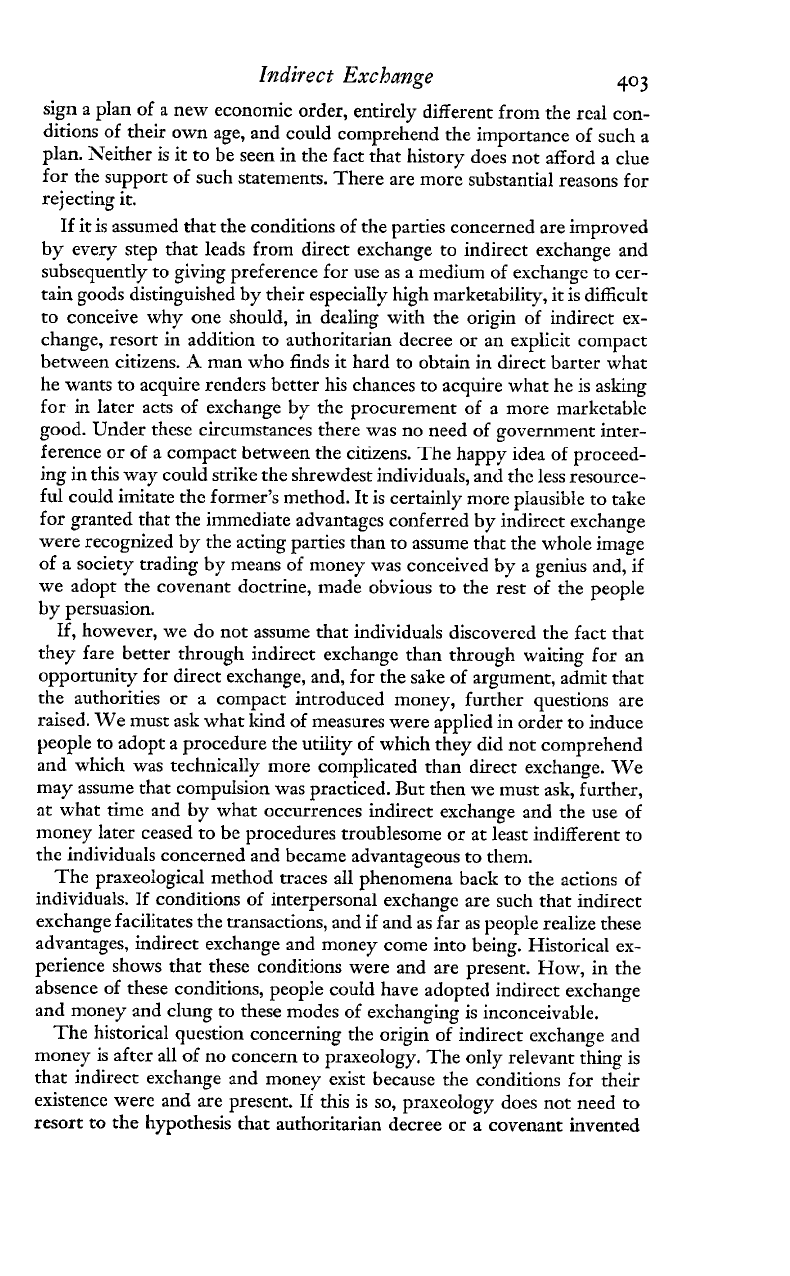
Indirect
Exchange
sign a plan of a new economic order, entirely different from the real con-
ditions of their own age, and could comprehend the importance of such a
plan. Neither is it to be seen in the fact that history does not afford a clue
for the support of such statements. There are more substantial reasons for
rejecting it.
If it is assumed that the conditions of the parties concerned are improved
by every step that leads from direct exchange to indirect exchange and
subsequently to giving preference for use as a medium of exchangc to cer-
tain goods distinguished by their especiaIly high marketability, it is difficult
to conceive why one should, in dealing with the origin of indirect ex-
change, resort in addition to authoritarian decree or an explicit compact
between citizens.
A
man who finds it hard to obtain in direct barter what
he wants to acquire renders better his chances to acquire what he is asking
for in later acts of exchange by the procurement of a more marketable
good. Under these circumstances there was no need of government inter-
ference or of a compact between the citizens. The happy idea of proceed-
ing in this way could strikc the shrewdest individuals, and the less resource-
ful could imitate the former's method. It is certainly more p1ausibIe to take
for granted that the immediate advantages conferred by indirect exchange
were recognized by the acting parties than to assume that the whole image
of a society trading by means of money was conceived by a genius and, if
we adopt the covenant doctrine, tnade obvious to the rest of the people
by persuasion.
If, however, we do not assume that individuals discovered the fact that
they fare better through indirect exchangc than through waiting for an
opportunity for direct exchange, and, for the sake of argument, admit that
the authorities or a compact introduced money, further questions are
raised.
We
must ask what kind of measures were applied in order to induce
people to adopt a procedure the utiiity of which they did not comprehend
and which was technically more complicated than direct exchange. We
may assume that compulsion was practiced. But then we must ask, further,
nt
what time and by what occurrences indirect exchange and the use of
money later ceased to be procedures troublesome or at least indifferent to
the individuals concerned and became advantageous to them.
The praxeological method traces all phenomena back to the actions of
individuais. if conditions of interpersonal exchange are such that indirect
exchange facilitates the transactions, and
if
and as far as people realize these
advantages, indirect exchange and money come into being. Historical ex-
perience shows that these conditions were and are present. How, in the
absence of these conditions, people could have adopted indirect exchange
and money and clung to these modes of exchanging is inconceivable.
The historical question concerning the origin of indirect exchange and
money is after all of no concern to praxeology. The only relevant thing is
that indirect exchange and money exist because the conditions for their
existence werc and are present.
If
this is so, praxeology does not need to
resort to the hypothesis that authoritarian decree or a covenant invented
